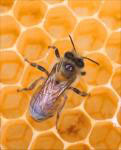NEW BEEKEEPERS ASSISTANCE PROGRAM BEING OFFERED THIS SPRING
Grant to Pay For Start-up Equipment and Assistance
For Immediate Release: March 5, 2008 Contact: Lynne Richmond
(609) 633-2954
(TRENTON) – The New Jersey Department of Agriculture, in partnership with Rutgers New Jersey Agricultural Experiment Station (NJAES), today announced a program to encourage new beekeepers in the state.
“Honeybees are vital to New Jersey’s fruit and vegetable industry through their pollination of crops, such as apples, blueberries, cantaloupes, cranberries, cucumbers, squash and pumpkins, which account for about $200 million in revenue each year,” said New Jersey Secretary of Agriculture Charles M. Kuperus. “With continuing threats to our honeybee population, we hope this cooperative venture will result in more beekeepers to help sustain the fruit and vegetable farmers who depend on honeybees to pollinate their crops.”
The program will offer up to $300 worth of beekeeping equipment and bees for first-time beekeepers that successfully complete the three-day 2008 “Bee-ginner’s Beekeeping” course offered by Rutgers NJAES Office of Continuing Professional Education. Participants must be New Jersey residents, over 10 years old, and register their apiary with the Department of Agriculture’s Division of Plant Industry.
“We at Rutgers are delighted to be partnering with the Department of Agriculture in this important service to beekeepers, fruit and vegetable growers, and the consumers of New Jersey,” said Robert Goodman, Rutgers University Executive Dean of Agriculture and Natural Resources. “Pollination by bees is essential to agriculture in the Garden State, and so we need to expand the number and the success of our beekeepers throughout the state.”
The program was made possible through a grant from the Department of Agriculture’s Division of Agricultural and Natural Resources. The first 50 people who meet the requirements will be able to purchase up to $300 of beekeeping equipment and bees from registered New Jersey bee supply dealers. Participants will not be given cash, but will have credit with the dealers, who will then submit itemized bills to the Department for reimbursement.
The State Apiarist and seasonal inspectors will periodically visit the new hives and provide technical assistance to the new beekeepers.
The new beekeeper program was first offered by the Department in 2006, generating a large amount of interest. In addition to the 50 people who completed the Rutgers course and received the free equipment, 91 people attended the two Rutgers “Bee-ginner’s Beekeeping” courses that were added that year. Out of those who took the course that year, 72 percent reported that they started keeping bees; 74 percent said they intended to add more colonies; and, 78 percent joined the New Jersey Beekeepers Association (NJBA).
Curtis Crowell, Secretary-Treasurer of the NJBA says there are currently about 450 members of the Association.
“Our numbers showed a definite improvement stemming from the year of the first Beginning Beekeeper program, which occurred at the same time that a groundswell of media attention focused on the plight of honeybees world-wide.” said Crowell. “The increase in beekeepers can only help farmers in New Jersey by adding to the pool of available pollinators so necessary for much of the food grown here, from blueberries and cranberries to vine crops and fruit trees.”
Beekeepers have been grappling with a mysterious dying off of colonies for no apparent reason, dubbed Colony Collapse Disorder, which struck the industry over the past few years. State Apiarist Tim Schuler is continuing to work with the researchers in trying various approaches to finding the cause of, and the solution to, the problem.
The number of honey producing bee colonies in New Jersey decreased from 11,000 in 2001 to 9,000 in 2006 and honey production was down 50,000 pounds to 324,000 pounds that year, according to the National Agricultural Statistics Service of the United States Department of Agriculture. The value of honey production in 2006 was $373,000.
The 2008 “Bee-ginner’s Beekeeping” course will be held April 10 to 12 at Rutgers EcoComplex in Bordentown. To register online, visit www.cpe.rutgers.edu/courses/current/ae0401ca.html. The course is taught by Tim Schuler, State Apiarist for the New Jersey Department of Agriculture, who has 21 years of beekeeping experience with honey production and pollination, and Bob Hughes, past president of the New Jersey Beekeepers Association, who has 25 years of beekeeping experience with honey production.
For more information, contact Tim Schuler, at (609) 292-5440 or visit the Department’s website at: www.nj.gov/agriculture/divisions/pi/prog/beeinspection.html.
For more information on the New Jersey Beekeepers Association, visit their website at http://njbeekeepers.org/.



